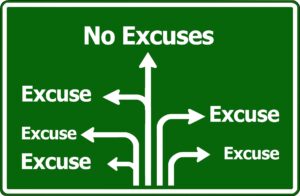
How Self-Excuses Restricts Human Growth
by Deepak Muduli | Feb 13, 2025 | Motivational Content
How Self-Excuses Restricts Human Growth

- Avoiding Responsibility
- Excuse: “It’s not my fault.”
- Impact: This mindset shifts blame onto external factors, avoiding accountability and limiting the opportunity to learn from mistakes. Growth requires self-reflection and the willingness to own outcomes.
- Fear of Failure
- Excuse: “What if I fail?”
- Impact: Fear-based excuses prevent individuals from taking risks or trying new things. Personal growth often comes from stepping out of comfort zones and learning through challenges.
- Procrastination
- Excuse: “I’ll do it later.”
- Impact: Delaying actions leads to missed opportunities. Growth requires consistent effort, and procrastination can lead to stagnation.
- Limiting Beliefs
- Excuse: “I’m not good enough.”
- Impact: Negative self-talk and low self-esteem limit potential. Believing in one’s abilities is crucial for pursuing and achieving goals.
- Comfort Zone Trap
- Excuse: “I’m okay where I am.”
- Impact: Comfort zones are growth-limiting because they prevent exploration of new ideas, skills, and experiences. Growth thrives on discomfort and adaptation.
- External Justifications
- Excuse: “I don’t have time/resources.”
- Impact: While external factors may pose challenges, over-reliance on such excuses fosters a victim mentality, hindering creative problem-solving and perseverance.
- Fear of Criticism
- Excuse: “What will people think?”
- Impact: Worrying about others opinions discourages authenticity and experimentation, which are key to self-improvement and personal satisfaction.
- Settling for Mediocrity
- Excuse: “This is good enough.”
- Impact: Accepting mediocrity prevents striving for excellence. Growth requires pushing boundaries and seeking continuous improvement.
- Overestimating Challenges
- Excuse: “It’s too hard.”
- Impact: Overestimating the difficulty of a task can discourage effort. Breaking challenges into smaller steps can make them more manageable and achievable.
- Underestimating Potential
- Excuse: “I’m not capable of that.”
- Impact: Doubting oneself leads to missed opportunities. Human potential is often greater than perceived, and pushing limits reveals untapped abilities.
- Rationalizing Poor Choices
- Excuse: “Everyone else is doing it.”
- Impact: Comparing oneself to others to justify inaction or poor decisions prevents self-driven growth and accountability.
- Lack of Vision or Purpose
- Excuse: “I don’t know what I want.”
- Impact: Without a clear goal or purpose, it’s easy to drift aimlessly. Growth is fueled by a sense of direction and meaningful aspirations.
- Overvaluing Short-Term Comfort
- Excuse: “I’ll just stick to what’s easy.”
- Impact: Prioritizing short-term comfort over long-term growth sacrifices progress. Growth often involves discomfort and persistence.
- Perfectionism as a Barrier
- Excuse: “I’ll start when everything is perfect.”
- Impact: Waiting for ideal conditions can lead to perpetual inaction. Progress is often made by starting imperfectly and improving along the way.
- Misusing Past Failures
- Excuse: “I failed before, so why try again?”
- Impact: Dwelling on past failures instead of learning from them undermines resilience. Growth thrives on adapting and persisting despite setbacks.
- Misalignment of Efforts
- Excuse: “It doesn’t matter anyway.”
- Impact: Believing efforts won’t lead to meaningful results demotivates action. Every small effort contributes to eventual success.
- Lack of Self-Discipline
- Excuse: “I can’t stick to it.”
- Impact: Self-discipline is essential for achieving long-term goals. Overcoming excuses builds the habits needed for sustained growth.
- Avoiding Feedback
- Excuse: “I don’t need advice.”
- Impact: Avoiding feedback denies valuable insights that can accelerate improvement. Constructive criticism is a cornerstone of growth.
- Excuses Breed A fixed Mindset
- Excuse: “I can’t change; it’s just who I am.”
- Impact: This excuse reinforces a fixed mindset, where people believe their abilities and traits are static. A growth mindset recognizes that effort and learning can lead to improvement in any area.
- Excuses Drain Motivation
- Excuse: “It’s not worth the effort.”
- Impact: Justifying inaction drains energy and motivation. Over time, this leads to a cycle of complacency and frustration, reducing self-confidence and the drive to achieve.
- Excuses Foster Regret
- Excuse: “I’ll get to it someday.”
- Impact: Procrastination leads to missed opportunities, resulting in regret. Many people look back wishing they had acted sooner, realizing they held themselves back unnecessarily.
- Excuses Perpetuate Fear
- Excuse: “It’s too risky.”
- Impact: Risk-averse excuses prevent the exploration of new opportunities. Growth requires courage and the willingness to face the unknown. Fear, when unchecked, becomes a persistent roadblock.
- Excuses Limit Creativity
- Excuse: “I’m not creative enough to solve this problem.”
- Impact: Excuses stifle the creative process by preventing people from experimenting and exploring new ideas. Creativity flourishes when individuals challenge their limitations.
- Excuses Reinforce Bad Habits
- Excuse: “This is just the way I do things.”
- Impact: Excuses justify habits that hinder progress. Breaking these patterns is essential for developing healthier routines that support personal and professional growth.
- Excuses Undermine Relationship
- Excuse: “They’ll understand why I didn’t try.”
- Impact: Consistently using excuses in relationships—whether personal or professional—erodes trust, credibility, and respect. Growth often stems from meaningful connections and collaborations.

By addressing self-excuses, individuals can unlock their potential, embrace challenges, and experience meaningful growth.
Practical Strategies to Break the Excuse Cycle
- Set clear goals: Define what success looks like for you.
- Adopt accountability tools: Use apps, trackers, or mentors to keep you on track.
- Embrace a learner’s mindset: Treat every challenge as an opportunity to grow.
- Celebrate small wins: Acknowledge progress to build momentum.
- Reframe failures: Use them as stepping stones, not barriers.
Eliminating self-excuses creates space for personal development, fosters resilience, and opens doors to previously inaccessible opportunities.
How To Recognize & Overcome Self-Excuses
- Practice Radical Honesty
Be brutally honest with yourself about your excuses. Write them down, identify the fears or beliefs behind them, and challenge their validity.
- Cultivate Resilience
Instead of avoiding challenges, adopt a “fail forward” mindset. Recognize that every setback is an opportunity to learn and build resilience.
- Reframe Excuses as Opportunities
For example, turn “I don’t have time” into “How can I better manage my time to make this a priority?” Reframing shifts focus from obstacles to solutions.
- Surround Yourself with Growth Oriented People
The people you spend time with influence your mindset. Engage with individuals who inspire, challenge, and hold you accountable to your goals.
- Use Visual Reminders
Create vision boards, set affirmations, or keep reminders of your goals and aspirations visible. These tools can motivate you to overcome excuses when faced with challenges.
- Build Momentum with Small Wins
Taking small steps toward a goal reduces the overwhelming nature of big tasks and builds the confidence to tackle larger challenges.
- Embrace the Power Of Why
Identify your deeper reasons for wanting growth. A compelling “why” can outweigh the temptation to make excuses.
- Replace Excuses with Affirmations
Transform your internal dialogue by replacing limiting excuses with empowering affirmations:
- From “I can’t do this” to “I’m capable of learning and succeeding.”
- From “It’s not the right time” to “Now is the perfect time to start.”
As we discussed some points regarding Self-Excuses Recognition, now here are points on how to overcoming self-excuses…
Overcoming Self-Excuses
- Self-awareness: Recognize and challenge your excuses.
- Action over perfection: Start with small, achievable steps.
- Growth mindset: Embrace failures as learning opportunities.
- Seek accountability: Share goals with someone who will support and motivate you.
- Reframe challenges: View obstacles as chances to innovate and grow.
Broader Impact of Letting Go of Excuses
- Enhanced Self-Awareness:
Taking responsibility for your actions fosters deeper self-awareness and emotional intelligence. - Increased Opportunities:
With fewer self-imposed limitations, you open doors to experiences, networks, and possibilities that were previously out of reach. - Better Problem-Solving Skills:
When you stop making excuses, you naturally develop a solutions-oriented mindset, making you more resourceful and adaptive. - Improved Confidence:
Every time you face a challenge without excuses, your confidence grows, reinforcing your belief in your abilities. - Greater Fulfillment:
Breaking free from excuses allows you to live in alignment with your values, pursue meaningful goals, and experience a richer sense of purpose.
Certainly! Let’s explore additional angles, deeper psychological underpinnings of self-excuses restricting growth:
Excuses as Symptoms of Deeper Issues
- Lack of Purpose
- Symptom: “Why bother? It doesn’t matter anyway.”
- Deeper Issue: A lack of clear life direction or personal meaning.
- Solution: Reflect on personal values and passions to identify motivating goals.
- Burnout and Overwhelm
- Symptom: “I just can’t handle it right now.”
- Deeper Issue: Mental or emotional exhaustion may lead to avoidance through excuses.
- Solution: Focus on self-care, prioritize tasks, and break goals into manageable steps.
- Perfectionism
- Symptom: “If I can’t do it perfectly, I won’t do it at all.”
- Deeper Issue: Fear of judgment or failure.
- Solution: Embrace imperfection as part of the learning and growth process.
Practical Exercises to Overcome Excuses
- Excuse Journal
- What to Do: Write down every excuse you make during a day or week. Analyze patterns and underlying fears.
- Benefit: Increased self-awareness and identification of recurring barriers.
- Visualization Technique
- What to Do: Visualize yourself achieving your goals without obstacles. Imagine how it feels and the benefits it brings.
- Benefit: Builds motivation and reduces the power of excuses.
- Five Whys Analysis
- What to Do: For each excuse, ask “Why?” five times to uncover the root cause.
- Benefit: Helps dig beneath surface-level excuses to understand deeper fears or challenges.
- Daily Small Wins
- What to Do: Commit to one small action daily that challenges an excuse.
- Example: If the excuse is “I’m too tired to exercise,” commit to a 5-minute stretch session.
- Benefit: Builds momentum and shifts the focus from inaction to progress.

Self-excuses are comforting in the short term but detrimental in the long term. By identifying, challenging, and replacing them with constructive actions, you can unlock your full potential and embrace a life of continuous growth and achievement.
This article is specially dedicated to one of my close friend from Balasore, Odisha. I was inspired by her thoughts, which I found truly insightful and compelling. Because of this, I felt compelled to write this article. I believe you will also find it useful and impactful.
Thank you so much for reading my article till the end!
“Keep learning, keep growing, keep achieving.”
Your well-wisher,
Deepak Muduli

Recent Comments